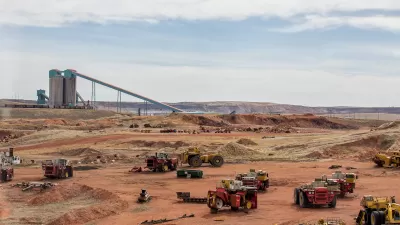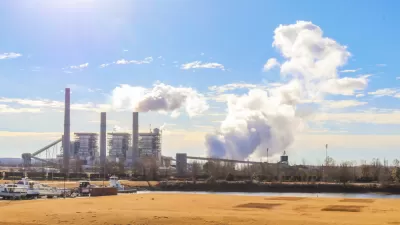Pres. Obama was accused of 'waging a war on coal' - rightly or wrongly, and the fossil fuel industry pumped funds heavily into his opponent's campaign, while environmentalists backed the president. How will this affect federal energy policy?
Juliet Eilperin and Steven Mufson write that "President Obama's reelection, along with key wins by Senate Democrats, ensures that the federal government will press ahead with efforts to promote renewable energy and energy efficiency and to curb greenhouse gas emissions linked to climate change." It is "likely that a second Obama term will deliver some, but not all, of environmentalists' top priorities."
Aside from public energy policy, the energy markets reacted to the president's re-election.
"Investors were quaking already, pummeling shares of coal-mining companies that waged a vigorous advertising battle against Obama's reelection and which are potential casualties of any curbs on greenhouse gas emissions. Shares of Peabody Energy fell 9.6 percent Wednesday, Arch Coal plunged 12.5 percent, Consol Energy dropped 6.1 percent, and Alpha Natural Resources sank 12.2 percent."
"Obama's re-election . . . provides the basis for positive movement on clean tech and climate action once the new Congress meets," the banking giant HSBC's global research group told investors in a research note. But it added, "Silence on climate issues during the campaign until the onset of Hurricane Sandy and continued Republican majority in the House means that scope for strategic action will remain limited."
Environmentalists expect payback.
"What we expect is the president to deliver on climate, roll up his sleeves and build on the modest success of what he's done so far," said Michael Brune, Sierra Club executive director.
However, the pendulum swings both ways for a re-elected President Obama, writes Hearst reporter Jennifer A. Dlouhy.
Obama is now free "to approve natural gas exports and the controversial Keystone XL pipeline without fear of alienating environmentalists he needed at the ballot box."
Thanks to AR SmartBrief
FULL STORY: Obama to continue efforts to curb greenhouse gases, push energy efficiency

Alabama: Trump Terminates Settlements for Black Communities Harmed By Raw Sewage
Trump deemed the landmark civil rights agreement “illegal DEI and environmental justice policy.”

Study: Maui’s Plan to Convert Vacation Rentals to Long-Term Housing Could Cause Nearly $1 Billion Economic Loss
The plan would reduce visitor accommodation by 25% resulting in 1,900 jobs lost.

Why Should We Subsidize Public Transportation?
Many public transit agencies face financial stress due to rising costs, declining fare revenue, and declining subsidies. Transit advocates must provide a strong business case for increasing public transit funding.

Paris Bike Boom Leads to Steep Drop in Air Pollution
The French city’s air quality has improved dramatically in the past 20 years, coinciding with a growth in cycling.

Why Housing Costs More to Build in California Than in Texas
Hard costs like labor and materials combined with ‘soft’ costs such as permitting make building in the San Francisco Bay Area almost three times as costly as in Texas cities.

San Diego County Sees a Rise in Urban Coyotes
San Diego County experiences a rise in urban coyotes, as sightings become prevalent throughout its urban neighbourhoods and surrounding areas.
Urban Design for Planners 1: Software Tools
This six-course series explores essential urban design concepts using open source software and equips planners with the tools they need to participate fully in the urban design process.
Planning for Universal Design
Learn the tools for implementing Universal Design in planning regulations.
Smith Gee Studio
Alamo Area Metropolitan Planning Organization
City of Santa Clarita
Institute for Housing and Urban Development Studies (IHS)
City of Grandview
Harvard GSD Executive Education
Toledo-Lucas County Plan Commissions
Salt Lake City
NYU Wagner Graduate School of Public Service




























